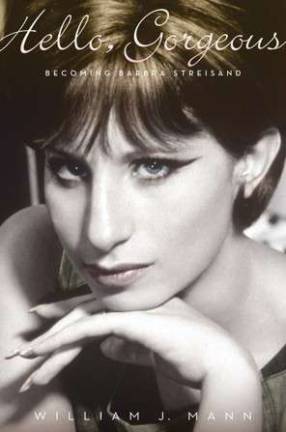Hello Gorgeous: Charting the First Lap of a Star Who Outran Them All

When Barbra Streisand tied Katharine Hepburn for the 1968 Best Actress Oscar, she became one of the few Jewish film actresses to nab Hollywood's highest honor, a list that, to this day, numbers only six in Oscar's 84 years of ceremonies. That she remains the only true star that on that extremely short list makes her achievement all the more distinctive. And that someone as visibly, pronouncedly Jewish should forever share her moment with Hepburn, celluloid' s ultimate WASP exemplar, makes that announcement even more of a milestone. So who should know better to chronicle Streisand in Hello, Gorgeous: Becoming Barbra Streisand than author William J. Mann, who has previously penned the insightful biography Kate: The Woman Who Was Hepburn? While the title cribs from Streisand's signature, first line in Funny Girl, the movie that nabbed her her first Oscar, Mann never gets to that point. Instead, he focuses on a smaller window of her life, from 1960 to 1964, as the ambitious performer first made it out of the Brooklyn house dominated by her tough mother, Diana Kind, and began her launch into the stratosphere. He homes in on the gray areas usually bypassed in James Lipton's useless Inside the Actor's Studio filmographies. And so Gorgeous becomes a simultaneous dissection of a woman, a star, a talent and an industry all at once. Meticulously researched and told with a cunning sense of acuity, Gorgeous provides enough personal details to whet the appetite without veering into overly salacious territory. Mann recounts Streisand's family background ? the father she lost before her second birthday, her mother's remarriage and the rancorous relationship between the two women. He provides new accounts of her early sexual fumblings and the start of her relationship with first husband Elliott Gould, his subsequent drug use and her eventual straying. And if he gives short shrift to her early recording successes and Emmy and Grammy wins, his detailed account of ascent to Broadway stardom in I Can Get It For You Wholesale and then attachment to the Fanny Brice story in Girl remain a testament to a day when stardom still required both pluck and talent. Most important of all, however, was how Streisand wore her ethnicity on her sleeve. Her refusal to alter her nose or name and her penchant for over-enunciating were both a shtick and a calling card. Mann dwells on how she forced people to look at her as is, which was a gamble, equal parts brave and stupid. While other Jewish actresses had become familiar to audiences (including Judy Holliday), most were relegated to character actress status. Streisand would blast past all of them. Through a series of interviews with such subjects as Kaye Ballard and Lainie Kazan, Mann carves a very human portrait. He details the nerves and insecurities that came her way as a performer, even as the encomiums did as well. He acknowledges that she was never known to say "thank you," but also highlights the rare instances when she did. Gorgeous was not authorized by its subject, but nor was Mann's access to information blocked in any way. It differs from other treatises on the woman who would sing "I'm the Greatest Star" in that instead of charting the course of her life and career ? divorce, diva reputation, refusal to perform live ? it focuses on the mechanics of the roller coaster that would lead to all the ups and downs. And this tome, at more than 500 pages, is quite the well-oiled machine. It's a must for those who know nothing about La Streisand as well as for those who think they already know it all. For more information about Hello, Gorgeous, go to [williamjmann.com](http://www.williamjmann.com/books/nonfiction.html).